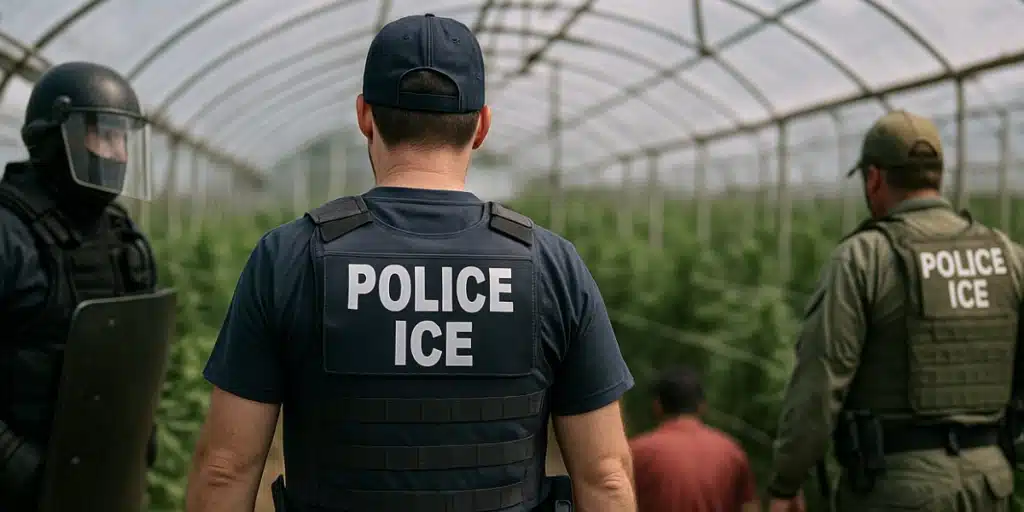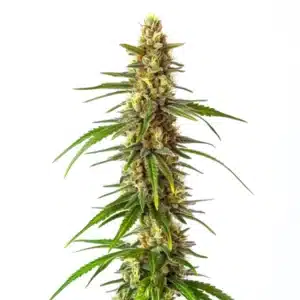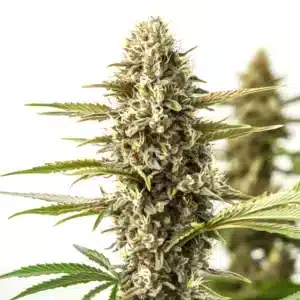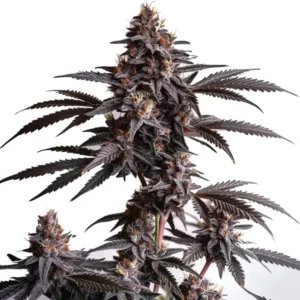
ICE Conducts Major Raid at California Cannabis Farm: Labor Crisis in the Legal Industry?
In mid July 2025, the U.S. Immigration and Customs Enforcement (ICE) carried out a large scale raid on Glass House Farms, one of California’s largest legal cannabis cultivation operations, located in Ventura County. The raid, which resulted in the detention of over 300 undocumented workers, has sent shockwaves through the legal cannabis industry. Allegations of child labor and exploitative working conditions have raised serious questions about labor compliance and ethical practices within the industry.
This unprecedented action has not only triggered a federal investigation but also intensified scrutiny of how the legal cannabis sector manages its workforce, particularly regarding vulnerable and undocumented labor.
Recommended Strains
OG Kush
|
|
THC | 20% - 24% (Medium) |
|
|
Type | Feminized |
|
|
Yield | Medium |
|
|
Phenotype | 55% Indica / 45% Sativa |
Girl Scout Cookies
|
|
THC | 18% - 25% (Medium) |
|
|
Type | Feminized |
|
|
Yield | High |
|
|
Phenotype | 60% Indica / 40% Sativa |
What Happened at Glass House Farms?
The Raid
In July 2025, ICE launched a coordinated enforcement action at Glass House Farms, citing credible reports of immigration violations, labor abuse, and the use of underage workers. According to witnesses, the raid resembled a tactical operation, involving riot control gear, rubber bullets, and tear gas. More than 300 undocumented workers were taken into custody.
Authorities described the raid as the result of a months-long investigation into labor violations at the site, alleging systemic exploitation masked under the veil of a licensed cannabis operation.
Child Labor Allegations
Among the most disturbing revelations was the confirmed presence of minors as young as 14 working on the farm. Preliminary reports suggest that these minors were employed in cultivation tasks and worked long hours under potentially unsafe and unsupervised conditions. Photographic evidence and anonymous interviews have since surfaced, adding weight to the claim that child labor was not incidental, but systemic.
Immediate Consequences
The fallout from the raid was immediate and severe:
- Use of force against protesters: Community members and activists who gathered to protest the raid were met with rubber bullets and tear gas.
- Casualties: Three people were hospitalized as a result of the confrontation, and tragically, one person died during the operation. The cause of death is under investigation.
- Federal investigation launched: Glass House Farms is now under formal federal investigation for labor, immigration, and human rights violations.
Promos & Deals
Industry on Alert: What the Incident Reveals
Here are three popular California strains:
- OG Kush: One of the most iconic strains from California, known for its potency and distinctive earthy, citrus flavor. It’s ideal for those seeking a strong relaxing effect.
- Girl Scout Cookies: This strain has gained worldwide popularity thanks to its delicious taste and powerful euphoric effects. It combines characteristics from several strains, offering a well-balanced experience.
- Sunset Sherbet: With sweet and fruity notes, this strain is known for its lush flavor profile and relaxing effects, perfect for unwinding at the end of the day. You can explore more about these strains in our catalog
Legality Does Not Equal Ethical Practices
The Glass House Farms raid challenges the common assumption that licensed cannabis operations are automatically operating ethically and within the bounds of labor law. While most businesses strive for compliance, this case demonstrates how exploitative conditions can exist even within the regulated market, raising serious concerns about the industry’s internal oversight mechanisms.
Reliance on Vulnerable Labor
The raid has exposed a deeper truth about the cannabis industry’s reliance on undocumented and underprotected workers, many of whom are drawn into the sector by the promise of relatively high wages but face exploitative practices once employed. These workers often fear retaliation or deportation if they speak out, creating a power imbalance ripe for abuse.
“Everyone knows these farms don’t run without immigrant labor. The difference here is someone finally got caught,” said an anonymous former supervisor in the industry.
Industry Wide Repercussions
Responses from Cannabis Operators
In the aftermath, other licensed cannabis companies have scrambled to distance themselves from Glass House Farms, issuing public statements affirming their own compliance with labor and immigration laws. Some have called for industry-wide audits to restore consumer trust.
Several trade associations and advocacy groups have seized on the moment to demand sweeping reforms and federal labor protections tailored to the cannabis sector.
Investor Concerns
The financial impact is also being felt. Investors are now voicing concerns about:
- Reputational risk: Association with brands involved in labor scandals can quickly erode consumer trust.
- Regulatory exposure: Increased scrutiny could result in tighter restrictions, adding operational burdens and legal uncertainties for license holders.
- Insurance and liability: Labor violations could lead to costly lawsuits, potential license revocations, and exclusion from financial services.
Legal and Regulatory Context
Federal vs. State Jurisdiction
Despite cannabis being legal in California, it remains a Schedule I controlled substance under federal law. This contradiction creates a gray area in which federal agencies like ICE still hold authority, especially when it comes to labor enforcement and immigration.
While California mandates labor protections and imposes safety standards for cannabis operations, enforcement can be inconsistent—especially when violations are obscured by forged paperwork or shell labor contractors.
Employment and Immigration Law Violations
Under federal labor law:
- Hiring undocumented workers is illegal, and employers are required to verify eligibility through the I-9 system.
- Employing minors in agricultural roles is heavily restricted, especially in high-risk environments like cannabis cultivation.
If Glass House Farms is found guilty of violating these laws, it could face:
- Millions in fines
- Loss of licenses
- Civil and potentially criminal liability for owners and executives
Firsthand Accounts from Workers
Following the raid, journalists and activists spoke with current and former workers who described alarming conditions:
- Excessive work hours: Some reported shifts lasting 12–14 hours, often without proper breaks or overtime compensation.
- Unsafe working environments: Workers handled chemicals and heavy equipment without proper training or protective gear.
- Lack of contracts: Many workers were paid in cash, with no formal documentation or employment contracts.
- Threats of deportation: Supervisors allegedly threatened to report workers to immigration authorities if they complained or refused extra shifts.
A 17-year-old former worker (identity withheld) shared:
“They said if we talk, they’ll call ICE. We didn’t feel like we had a choice. We worked scared every day.”

Public and Political Reactions
Public Response
The event has triggered fierce debate:
- Supporters of ICE have applauded the operation, framing it as necessary to uphold immigration laws and protect minors from exploitation.
- Critics argue the raid was excessively militarized and may have caused more harm than good, especially for the many undocumented workers who were simply trying to earn a living.
Social media platforms lit up with hashtags like #CannabisLaborCrisis and #ICEinVentura, reflecting the divided sentiment.
Official Statements
California Governor Gavin Newsom issued a statement expressing “grave concern” and announcing that state-level labor and child welfare agencies would launch parallel investigations.
Meanwhile, organizations such as the American Civil Liberties Union (ACLU) have called for:
- Full transparency into the raid’s planning and execution
- An independent review of the use of force
- Legal assistance for detained workers
Congressional Response
At the federal level, a bipartisan group of lawmakers has proposed the formation of a Cannabis Labor Oversight Task Force, aimed at:
- Monitoring labor conditions in legal grow operations
- Creating a federal certification for ethical cannabis producers
- Establishing a national registry of violations accessible to regulators and consumers
A Turning Point for Cannabis Labor Reform?
Breaking the “Green Silence”
For years, the cannabis industry has promoted itself as a progressive force for criminal justice reform, economic opportunity, and public health. However, this raid has revealed that serious labor abuses can exist even within the legal market, particularly when oversight fails and profit becomes the priority.
Industry Pressure for Ethical Certification
In response, labor advocates and trade associations are pushing for new standards:
- Voluntary ethical certifications, similar to Fair Trade or USDA Organic, that reflect fair labor practices
- Mandatory third-party audits for medium and large-scale operations
- Protections for whistleblowers and expanded access to legal representation for farmworkers
Workforce Unionization and Advocacy
Some groups are now organizing to unionize cannabis farmworkers, arguing that collective bargaining may be the only way to balance the scales in an industry with uneven power dynamics and high stakes. Several pilot union chapters have already launched in Northern California.




















